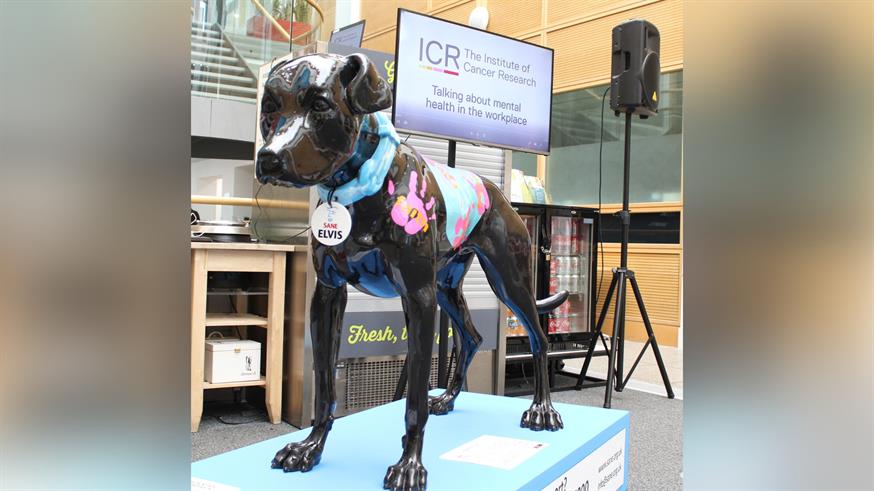
Image: Black Dog at the ICR in Sutton. Credit: Graham Shaw, ICR
The black dog statues have been hosted in public institutions and open spaces around the UK, and the arrival of ours – named Elvis – acts as a striking visual talking point to help open up conversations around mental health.
The use of a black dog to represent depression has often been linked to Winston Churchill, who spoke about his own struggles with his 'dark moods' by referring to the 'black dog'.
The arrival of the statue forms part of a wider campaign around wellbeing and mental health at the ICR. Leading with the tag-line ‘Your wellbeing is our wellbeing’, the campaign follows on from the launch of our Six Values last year – and aims to support staff and students in feeling valued, supported and happy in the workplace.
Talking about mental health
We spoke to Professor Judith Bliss, Director of the Cancer Research UK-funded Clinical Trials and Statistics Unit at the ICR, who shared some of her reflections on mental health in the workplace.
She said: “I think it’s important to recognise that mental health problems such as anxiety and depression are extremely common across all strands of the population. I’d anticipate that most people in the ICR have been affected in some way by a mental health disorder, either themselves personally or amongst their close family and friends.”
Judith spoke about how historically, mental health has not always been something we have been good at talking about in the workplace, particularly in the academic community. She shared a personal anecdote from around 20 years ago where a senior academic was advised to seek counselling privately, so that a mental health referral did not appear in their GP records.
Judith said that this story had always stuck with her as an example of what needed to change – so that we are better able to support one another personally and professionally – and how vital this was in a research institution working to improve outcomes for patients.
Pressures in the workplace
Judith also spoke about some of the particular pressures that colleagues working in research can face – from the pressure to publish and bring in grants, to navigating career progression in academia, and why it is so important to take the time to support and listen to one another.
She said: “People who suffer from mental health issues usually learn strategies to cope with it. However, the stresses and pressures of the workplace can make it harder to implement those strategies, particularly if it coincides with someone having an episode of anxiety or depression.
“So we need to be aware at the earliest opportunity if someone’s personal resilience is low. Working at the ICR there will be pressures – we are a very successful, high-achieving institution. Often these pressures will be around deadlines – for example a PhD deadline, or a grants submission, or a paper deadline or a corporate project deadline.
“Those deadlines can either be quite lonely, if it’s just one person working towards a deadline when someone might feel quite exposed as an individual, or they can be really big team initiatives and then sometimes the team dynamics can add to stresses and strains.
“So really it’s about talking to each other so we can be aware of the different pressures of working together within a team science environment to minimise the strain on our colleagues.”
The ICR is committed towards creating a non-limiting and fully inclusive environment for staff and students to achieve their organisational and personal goals and recognise that providing appropriate support to individuals will help us to achieve this.
Read more
What we are doing at the ICR
At the ICR, our network of wellbeing advisers and student confidants plays a fundamental role in supporting our wider staff and student population – acting as an informal point of contact for their peers to raise concerns confidentially on any issue.
The network provides an approachable form of peer-to-peer support, holding regular tea and talk sessions, sharing information and promoting ICR-wide wellbeing initiatives.
In May we launched a new wellbeing hub on our intranet to signpost staff and students towards new and existing information and resources – from mental and physical health and work-life balance, to building resilience, and knowing who to talk to.
Our Chief Executive, Professor Paul Workman, said: "Being able to discuss mental health and wellbeing is fundamental to the health and happiness of our staff and students – and to the ICR.
"I know this campaign will resonate with many people, and it's important for us all to take the time to check in with each other, and to make sure we get a good balance in our lives.”
comments powered by